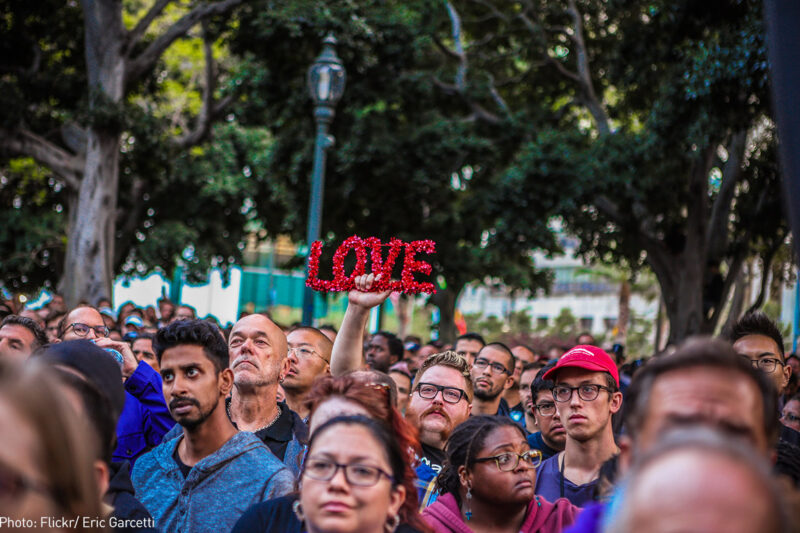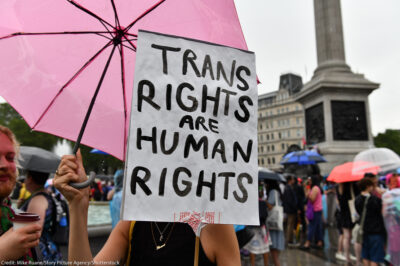
This piece originally appeared at The Tampa Bay Times.
Sunday afternoon, as the shocking details of the shooting at gay nightclub Pulse in Orlando trickled in and the totality of the horror was becoming clear, I had a strange realization: I’ve been to that bar.
As a gay man, I want to let straight folks know a little secret: For many of us, when traveling, the first thing we do after setting down our bags in the hotel room is open up Yelp and find the nearest gay bar. Sure, grabbing a beer at the hotel bar might be easier. But whatever strange town you’re in, a gay bar is an extension of home.
By “home,” I don’t mean where you’re from; I mean someplace where you are welcome, where you can relax, where you are instantly understood without saying a word.
We need places like that, because in so many ways, some more obvious than others, the world reminds LGBT people that we don’t belong and are not welcome. Powerful people say treating us with dignity would infringe on their religious freedom, or label us all pedophiles and rapists.
Even the most secure and confident queer person has to be subconsciously aware that he or she shares a world with people who hold these beliefs — and may act on them. This means being constantly aware of how people perceive us — Was that too lispy? Can I mention my wife? Will they ask for my ID? Can we kiss here? Even hug? Will he fire me if he finds out?
That’s why places like Pulse exist — so, if just for a little while, we can let our guard down, maybe dance, maybe flirt (maybe more than that), and be someplace where the endless roar of voices telling us “you don’t belong” can’t reach us. For some, these may be the only places they can call “home.” So after a work event in Orlando a few years back, with a couple hours to kill before bed, I stopped into a local gay bar called Pulse for a drink.
Florida has a long history as epicenter for historic LGBT rights battles. In 1977, former Miami-Dade Commissioner Ruth Shack introduced an ordinance banning discrimination against gays and lesbians. The ordinance created a firestorm, and the repeal effort, spearheaded by orange juice queen Anita Bryant, launched the nationwide anti-gay political movement that saw electoral power flow to those who exploited anti-LGBT fears.
The terms of four decades of “culture wars” were set, with politicians — some of whom probably truly believed, but many just after votes — using the power of the government to make LGBT people’s lives just a little more miserable than everyone else’s.
But that’s only half the history. Bryant’s crusade also galvanized a nascent gay rights movement into a powerful and savvy nationwide political force. Gay bars, once discreet places to hide from the rest of the world, became centers for community organizing. We fought back, and bit by bit, began winning victories for LGBT people.
We’ve come a long way since the ’70s. When I started at the ACLU six years ago, we finally defeated the last vestige of Bryant’s crusade: Florida’s discriminatory ban on adoptions by gay men and lesbians. Last year, we won marriage equality in Florida, then nationwide at the U.S. Supreme Court. It finally feels like we’re winning.
Perhaps that’s why the atrocity last weekend feels so horrifying: It’s a reminder of how fragile our progress is — how far we still have to go.
The fact that I’ve been to Pulse is really just trivia. Most LGBT people in America haven’t. But whether or not you’d been there, it doesn’t change the fact that someone came into our home early Sunday morning and murdered 49 of our brothers and sisters.
Even now, as LGBT Americans and our allies are still in shock, many politicians are shamefully either ignoring the fact that this was an attack on LGBT people or trying to erase us from the narrative. Perhaps this comes from a desire fold the attack into a more politically convenient narrative fed by anti-Muslim fear and hate — an effort that seems all the more misguided as a complex and contradictory portrait of the killer comes into focus. Or perhaps they can’t reconcile the reality with their own work against LGBT people.
Florida’s LGBT history includes anti-gay placards demanding “Save Our Children,” a cruel law that pointlessly denied children loving adoptive homes, one of the first “bathroom bills” in the country, an attorney general who appealed every court ruling against the ban on marriage equality, and now the largest mass shooting in American history.
But that’s only half the history. The other half is our resistance. We write that story in our own words.
We will never stop fighting back.




